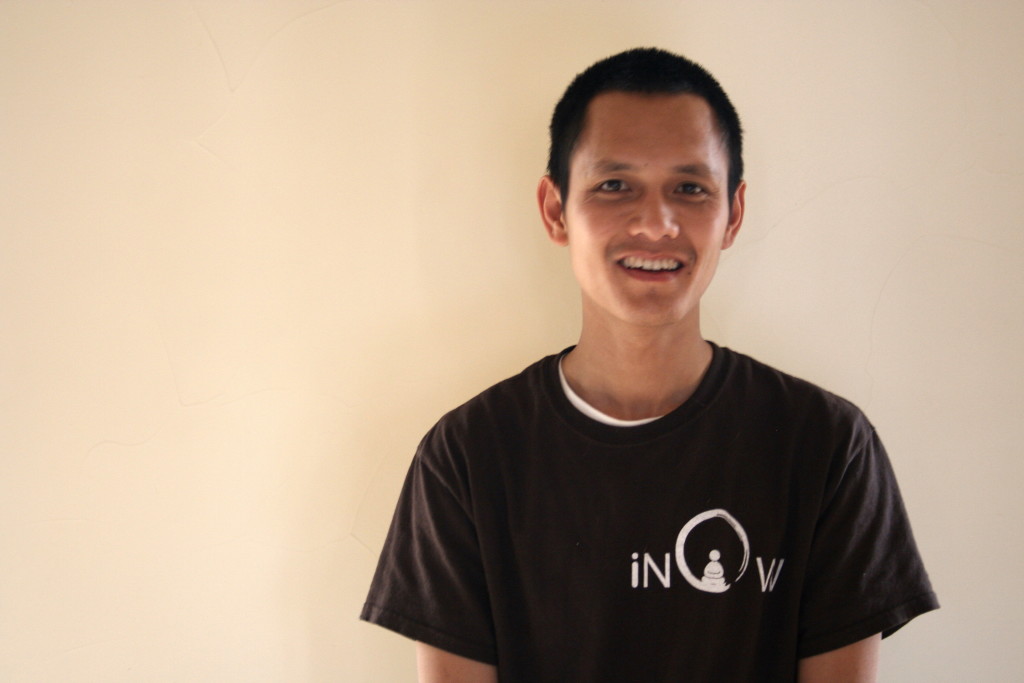“Becoming a practitioner was a gradual process for me. I first learned about Buddhism in the youth group at Kim Quang temple, attending a lot of Dharma classes. Later I started seeing those things manifest in my own life. For example, when I was a young boy, I used to loose things all the time, and I would get really upset about it. Then I learned about impermanence and realized: Oh hey, this is how life is. Recognizing this as a young child has helped me to change my perspective in life. I wasn’t as upset anymore when I lost things. I realized that if I lost something, sometimes it was because I was reckless or I didn’t care. So I think once you have at least an acceptance of how things are, you place less blame on outer circumstances, and instead you reflect more on your own actions. Once I became interested in the practice, I found many other channels in addition to the youth group. For example going to retreats by myself. I found a lot of peace at these retreats. When you actually practice, and it has a positive effect in your life, then you will continue, or else it is just like something you learn at school, which you forget again later.”
“I think everything around you affects you and makes up part of you. So the way I am today is in part due to the youth group. It’s how I was able to learn about Buddhism. Buddhism has become part of my life, and I see the positive impact it has. Giving the same opportunity to a younger generation is priceless. That’s why I am a youth group leader now. It’s about creating conditions. Everybody has Buddha Nature but sometimes we need the right conditions to help us knock on that door. The youth group is a way for the younger generation to be exposed to Buddhism, and to start learning about themselves. I think the time I put into this is worth it, and it is also an opportunity for me to practice.”
“If I did not have the practice, I would be an angrier person. I am sure of that. But luckily through the practice, now more than ever, I can catch my anger more easily. I can go back to my breathing or listening, and it goes away pretty quickly. But on days when I don’t practice, I add on to that anger with additional emotions, which stretches out the period of anger. The first person who is affected by this negative energy is yourself, regardless of what you say to the other person. Sometimes we reason too much, and that’s when we lose our compassion. We need to take a moment and pause so we don’t lose ourselves in our anger.”
“One thing I have found to be effective in dealing with anger is to practice even when you are not angry. Because when you get angry, you don’t practice. You don’t go to the battle ground to practice, you practice when you are not battling, so you are prepared when you go to battle. When we have an initial thought of anger, we can sense it, and the more we practice, the more we can be aware and catch it before it gets out of hand. I sometimes find myself getting into a loop: something happens, I get angry, I judge myself about getting angry, and then I get down hard on myself. Later I realize how ineffective this is. It doesn’t make sense. It’s stupid, and when we recognize this, we can laugh at ourselves. That is already a sort of transformation.”
“I have come to accept that there are some people we get along with and others we don’t get along with. Sometimes when an individual treats you unreasonably, there is a karmic force between you and them. We should continue to nurture our relationships with the people dear to us. Relationships need care, they don’t just grow on their own. And when we don’t get along with someone, we should recognize it and continue to practice so that we can see them in ourselves. When I see that we both suffer, that we have the same sickness, then the tension automatically lessens. If you can’t love them, at least don’t hurt them. You can’t put oil in the fire and think it will lessen. We often create these situations and then ask ourselves why these things are happening to us. Instead, we should try to transform ourselves.”
“Being able to practice the small things can be a big challenge. Throughout the day, when I open doors or take footsteps, I usually don’t recognize it. When I first wake up, I am not even sure I am aware that I am awake. I just wake up and do whatever I do next, without taking a pause. We try to do so many big things, but if we can’t even be aware of the little things we do, we are just running around being busy for nothing. Overcoming the habitual tendency of continuous running without pausing, that’s a goal I have set for myself. Becoming aware is nothing special, but it is being. I want to go back to being. Whenever I have a few moments to come back, at least I am feeling present and I am not just running along.”


